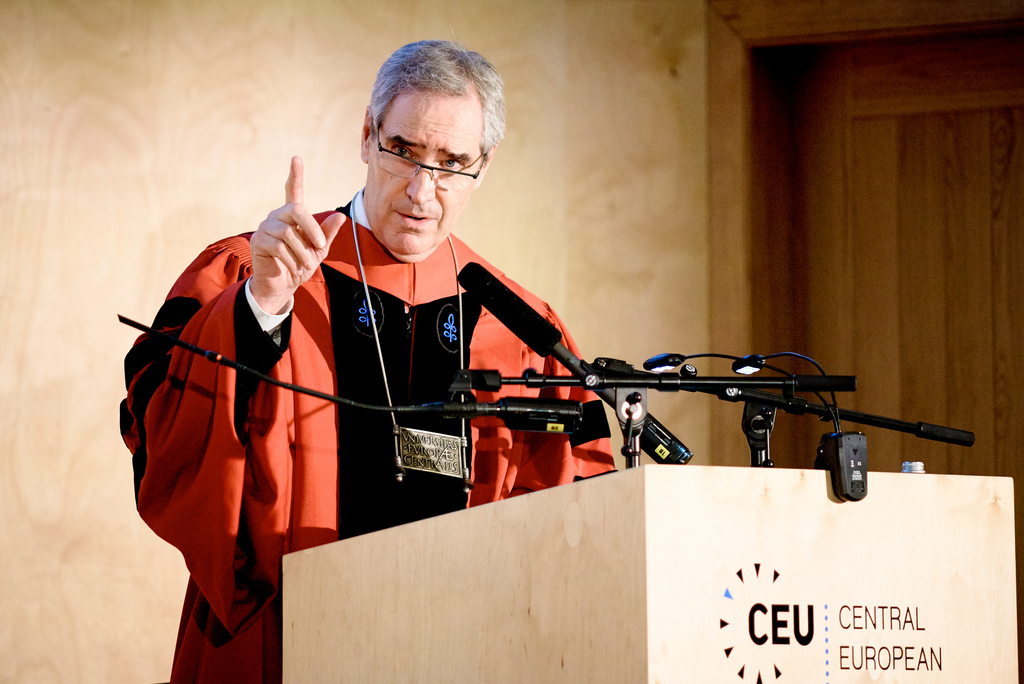Why Central European University Matters
One of Europe’s premier academic institutions is under attack by one of Europe’s least democratic states. Budapest-based Central European University (CEU) is threatened with closure by legislation proposed by the Hungarian government. This is not just a regulatory spat between Hungary’s administration and academia. It is an ideologically motivated show trial. It has been launched by Prime Minister Viktor Orbán, the self-professed leader of illiberalism and nativism. It is directed against CEU because the university stands for freedom of thought, liberal values, and internationalism. It is yet another test of the democratic mettle of the West, struggling as it is to fend off closure and autocracy.
April 4, 2017 -
Joerg Forbrig and Yael Ohana
-
Articles and Commentary

Founded in 1991 at the initiative of regional intellectuals with funding from George Soros, the Hungarian-born American investor and philanthropist, CEU’s original mission was to provide a Western-style, English-language education in the humanities and social sciences to students from across post-communist Europe. It assembled a star faculty from regional and Western universities, built the most modern campus east of the former Iron Curtain, opened business and public policy schools, and provided scholarships. CEU quickly became a laboratory of post-communist reform. Its 14,000 alumni are today actively contributing to government and public administration, academia, business, civil society, and media from Budapest to Bishkek.
The education provided by CEU has always stressed the values of democracy, social justice, the rule of law, public discourse, non-discrimination, and liberalism. This ethical compass, together with quality academic training, is CEU’s unique contribution to change-making in the region. CEU has also made it its mission to reinvigorate the intellectual landscape of Central and Eastern Europe, so ravaged by totalitarianism, war, and genocide. It established a world-class archive of 20th century regional history, translated and published key regional literature and thinking. And it promotes research on the simultaneous political, economic, and social transitions that swept through the post-communist region. In short, CEU has become an intellectual and moral authority.
CEU has long incurred wrath from the power hungry. Its Prague branch was evicted by then-Czech Prime Minister Vaclav Klaus. Yet, none of these challenges can be compared to the current attack. The proposed amendment to Hungary’s education laws demands that international universities fulfil two conditions. First, they must have a state-level agreement with the country of origin. Second, they must have a permanent educational program in that country as well as in Hungary. These conditions have been designed with CEU alone in mind and are near-impossible to meet. CEU’s courses are partly accredited in the United States, but are delivered exclusively in Hungary. It is not meaningful for CEU to establish study programmes in the United States, and the new White House is hardly going to support an agreement to facilitate a project supported in any way by Soros.
If CEU is to survive, this amendment must be stopped in its tracks. Only broad-based and resolute international support can achieve that. First, Westerners need to accept that Orbán’s illiberal ambitions have only grown over the years. Since his re-election in 2010, he has systematically neutered the democratic checks and balances — whether media or courts — that stand in the way of his absolute power. He is now zooming in on the few remaining islands of dissent in Hungary. Ridding Budapest of CEU would be a hugely symbolic victory for Orbán and his ilk.
Second, the success of this amendment would set a dangerous precedent. If a strong and independent institution like CEU can be forced into submission, democrats in Hungary will have to fear even worse to come. Civil society’s ranks will shrink, its structures will thin, its capacity to resist will be further weakened, and its ability to mobilize citizens will wither. This will only accelerate Hungary’s drift away from democracy.
Third, Orbán’s move against CEU is emboldening like-minded strongmen elsewhere in Central and Eastern Europe. From Poland to Serbia, governments are already copying the illiberal model established in Hungary. Civil societies in Bulgaria, Macedonia, and Romania are subjected to political witch hunts, hoping to intimidate these critical watchdogs. And like in Hungary, dissenters and civic activists are being singled out as the local fifth column in an international conspiracy of Western liberals, global finance, and Jews. Soros and the many democracy projects he supports make for the perfect scapegoat.
The significance of CEU’s case is not essentially in the fate of the university. What is at stake in Budapest is much more dramatic: the future of democracy in the entire Eastern half of Europe. For too long, Western capitals have turned a blind eye as democratic backsliding, illiberal tendencies, and brute nationalism gathered momentum. This complicity with Orbán and company must finally end. Rather than providing political cover, European conservatives led by Angela Merkel’s CDU, should suspend the membership of Orbán’s Fidesz in the European People’s Party. What is needed now is a strong show of solidarity and support for the besieged democrats of Central and Eastern Europe. That will save a lot more than CEU.
This piece was originally published on the German Marshall Fund of the United States’s website.
Joerg Forbrig is a senior transatlantic fellow with the German Marshall Fund of the United States.
Yael Ohana is the founder and principal of Frankly Speaking, an international educational consultancy. Both are CEU alumni.

































